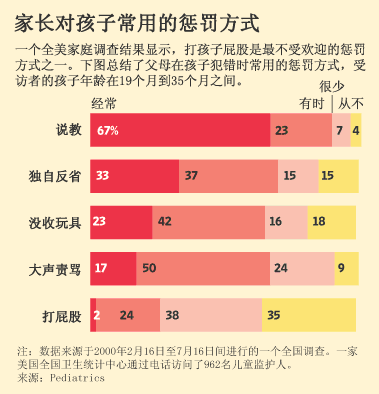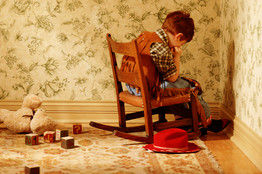双语杂谈:儿时挨打长大就要变傻(组图)
本文选自《少儿英语[微博]那点事》的博客,点击查看博客原文。
 家长[微博]常用的惩罚方式
家长[微博]常用的惩罚方式 围绕打孩子的争论远未平息
围绕打孩子的争论远未平息本周我在自己的专栏里分析了不久前三份分析打孩子屁股与认知发展受损之间关联的研究报告。杜克大学(DukeUniversity)发展心理学专家波林(Lisa J.Berlin)是其中一份的研究报告的作者之一,她在认知测试中发现,一岁时挨打的小孩在三岁时认知能力得分偏低。在另外一份研究报告中,作者之一的斯图鲁斯(MurrayStraus)也提出在一定年龄挨打的小孩会在日后认知测试得分较低。第三份报告也是斯图鲁斯撰写的,这份在不久前的一个大会上发表的研究报告将多个国家的儿童受体罚较多而平均智商下降的问题联系了起来。
对此类研究持怀疑观点的人指出,这些研究往往未能证明是打孩子造成他们日后认知能力下降,因为认知问题可能与行为问题相关,后者本身可能造成他们遭受体罚。波林的研究涵盖了这一问题,她研究了两岁时的认知发展是否与三岁时的挨打相关,结果是否定的。
俄克拉荷马州立大学(Oklahoma StateUniversity)研究方法学学者、斯图鲁斯在博士后研究时的同事拉泽莱尔(RobertLarzelere)指出,在针对体罚孩子的研究中,另一个常见的缺憾之处是没有对打屁股和其他形式的惩罚加以横向比较。波林的研究对此有所涉及,她在比较了打孩子屁股与口头惩罚之后发现,后者与认知能力降低无关。不过,拉泽莱尔说他在自己的研究中发现,所有纠错行为,不论有无身体接触,从本质上都会产生同样的效果。
密歇根州大急流城凯尔文学院(Calvin College)心理学教授甘农(MarjorieGunnoe)说,在研究孩子受体罚的问题上学者为了完成工作要等上很长时间,就是为了把自己的研究做得像上述报告那样质量一流。
不过,围绕打孩子的争论不可能因为这些研究而平息。美国儿童研究会(American Academy ofPediatrics)就和美国儿科医师学会(American College ofPediatricians)这家规模较小、较为松散的机构在一问题上发生了论战。后者认为在某些情况下打孩子屁股是可以的。阿拉巴马州蒙哥马利的儿科医生、美国儿科医师学会副总裁楚布尔医生(DenTrumbull)说,没人喜欢打孩子,但对一些孩子来说,这是唯一能有效地控制他的行为,并最终控制他意愿的办法。
北卡罗来纳大学(University of North Carolina)的家庭医学助理教授佐罗托(AdamZolotor)说,要想分析遗传学等足够多的变量,就需要进行非常复杂的研究。他说最好的办法是研究足够多从出生后就各自生活的双胞胎,需要至少500对,或许还需要更多;我不知道人们能否找到这么多研究对象。
阿拉巴马大学(University of Alabama)伯明翰分校医学院的教授、临床心理学家弗莱德曼(VivianFriedman)也认为仅靠一份研究不足以永久平息围绕打孩子问题的争议。她说,为了证实打孩子造成智商下降的假说,最好的办法就是对一个孩子反复进行智商测试(或许一年一次,或许两年一次),同时纪录他挨打的次数。她说,即便如此,也很难排除因其他身体或情感等环境因素造成的影响。
My print column this week examines three recent studies tyingspanking of children to their impaired cognitive development. Onestudy, co-authored by Lisa J. Berlin, a developmental psychologistat Duke University, found that spanking at age one is linked tolower scores on a cognitive test at age three. Another study,co-authored by Murray Straus, also ties spanking at one age tolower cognitive scores at a later age. And a third study by Straus,presented at a recent conference, ties nations' high rates ofspanking to lower average IQs。
Skeptics ofsuch studies note that they often fail to demonstrate that spankingcaused the measured effects; perhaps cognitive problems are tied tobehavioral problems, which themselves cause spanking. Berlin'sstudy addressed this by examining whether cognitive development atage two was tied to spanking at age three; it wasn't。
Anothercommon weakness of spanking studies, according to Robert Larzelere,a research methodologist at Oklahoma State University and formercolleague of Straus's as a post-doctoral fellow, is that they don'tcompare spanking to other forms of punishment. Berlin partiallyaddressed that, by comparing spanking to verbal punishment, whichdidn't have the same links to poor cognitive development. Larzeleresaid his own studies, however, show that all corrective actions -physical and otherwise - have essentially the same effects。
“Spankingresearchers have been waiting a long time for a study ashigh-quality as this one,” Marjorie Gunnoe, a professor ofpsychology at Calvin College in Grand Rapids, Mich., said。
However, thecontroversy over spanking isn't likely to be settled over thesestudies. It is a subject of dispute between the American Academy ofPediatrics and a smaller, splinter group called the AmericanCollege of Pediatricians that supports spanking in certaininstances. “No one likes to spank a child, but for some children itis the only method that will work to gain control of the child'sbehavior and ultimately the will,” said Dr. Den Trumbull, vicepresident of the group, and a pediatrician in Montgomery,Ala。
AdamZolotor, an assistant professor of family medicine at theUniversity of North Carolina, Chapel Hill, said that to control forsufficient variables such as genetics would require a complexresearch effort. “The best way to do this would be to get enoughtwins that were separated at birth,” he said. “Let's say you needat least 500 twins separated at birth, and probably more. I don'tknow if you could find that many。”
VivianFriedman, a professor and clinical psychologist at the Universityof Alabama at Birmingham school of medicine also doubts that aresearch study could ever settle the spanking debate. “The best wayto test their hypothesis that spanking lowers IQ would be to...tomeasure IQ in a child repeatedly over time (maybe every year or twoyears) while measuring the numbers of spankings administered,”Friedman said. “Even so, it would be hard to rule out otherphysical and emotional environmental factors for causality。”
- 狼爸家法:满12岁不再挨打“打法”超过百项2011-11-23 15:41
- 完不成作业请客找代写 孩子怕挨打爬上电线杆2009-08-11 14:00
- 女硕办分手中介怕挨打首笔业务未做2008-11-10 10:29
- 不顶勿入:一个日本人挨打的笑话2008-10-30 14:46
- 女孩:我为妈妈做饭为什么还要挨打?2008-07-29 21:19
